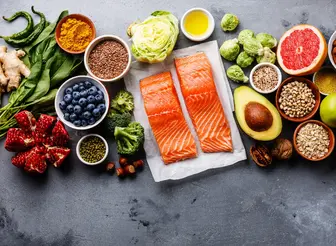Gut health is an important aspect of overall well-being. The gut digests food, absorbs nutrients, and helps the immune system. Neglecting gut health can cause a variety of problems, including abdominal pain, discomfort, bacterial imbalance, diarrhoea, and other disorders.
A healthy gut can be maintained by eating a balanced diet, engaging in regular physical exercise, getting enough sleep, staying hydrated, and practicing excellent cleanliness. A well-balanced diet is one of the most important and effective strategies to maintain gut health. Avoiding harmful meals and including a variety of gut-friendly items in our diets may help us maintain a healthy gut microbiota.
Here I will discuss some of the best foods for gut health, including high-fibre foods, fermented foods, polyphenol-rich foods, foods with omega-3 fatty acids, and prebiotic foods. Incorporating these foods into your diet significantly improves your gut health and overall wellness.
Benefits of high-fibre foods
Fibre-rich foods are crucial for maintaining good gut health. They aid in regular bowel movements, improve digestion, prevent constipation, and support the growth of healthy bacteria in the gut. Fibre contributes to a balanced gut flora, which can lower the risk of chronic diseases such as heart disease and diabetes, thus enhancing overall health and digestive well-being.
High-fibre foods | Best Foods for Gut Health
- Whole Grains
- Nuts and seeds
- Legumes
- Fruits and vegetables
Whole Grains

Whole grains are one of the best sources of dietary fibre, and they have several benefits for gut health. Some of the common whole grains are brown rice, oats, barley, quinoa, whole wheat, and millet. Adding them to your regular diet can give us essential nutrients along with better gut health.
Nuts and seeds
Nuts and seeds are also excellent sources of fibre. These types of foods are highly nutritious and beneficial for health and gut health. Nuts such as walnuts, almonds, brazil nuts, pistachios, and pecans are rich in fibre. Nuts promote regular digestion, provide prebiotics for beneficial gut microorganisms, and reduce inflammation. You can incorporate nuts into salads, yoghurt, or baking, and you can also enjoy a nut mix as a snack.
Common types of seeds, including chia seeds, flaxseeds, basil seeds, pumpkin seeds, and sunflower seeds, are rich in fibre, vitamins and minerals, healthy fats, and protein, which support our gut health along with our overall health. You may make a high-fibre, health-boosting drink with basil seeds, chia seeds, psyllium husk, and honey as a sweetener. Drinking one glass of these drinks in the morning will provide you with enough fibre, as well as aid digestion, hydration, and general health.
Legumes

Lugumes are one of the best sources of fibre and other nutrients that support gut health. Legumes, such as lentils, black beans, chickpeas, kidney beans, navy beans, peas, and soybeans, are rich in fibre, vitamins, and minerals. Incorporating legumes into your regular diet promotes bowel movement, feeds gut bacteria, reduces inflammation, and lowers the risk of colon cancer, which keeps your overall gut healthy.
Fruits and vegetables
Some of the fruits and vegetables contain high fibre and also provide other nutrients that are good for our gut health, such as apple bananas, berries, carrots, sweet potatoes, pomegranates, broccoli, kale, brussels sprouts, artichokes, and spinach. They provide soluble and insoluble fibre, antioxidants, act as prebiotics, promote the growth of good gut bacteria, and improve overall gut health. Adding a variety of gut-friendly foods to your diet can keep your gut and overall health safe.
Benefits of fermented foods
Fermented foods are excellent for gut health because they include bacteria and yeast that support our gut microbes. Some well-known fermented foods include yoghurt, miso, apple cider vinegar, kefir, and kimchi. These types of foods can enhance digestion, regulate the generation of beneficial bacteria, improve gut flora, prevent gastrointestinal infections, relieve symptoms of irritable bowel syndrome (IBS), enhance the absorption of nutrients, strengthen the immune system, aid in reducing gut inflammation, and maintain the overall health of our gut.
Fermented foods
- Yoghurt
- Kimchi
- Apple cider vinegar (ACV)
- Kefir
Yoghurt

It is one of the most popular and well-known fermented foods in the world. It contains probiotics, including actobacillus and bifidobacterium, which help regulate gut bacteria. Many studies have found that consuming yoghurt on a daily basis reduces irritable bowel syndrome (IBS) symptoms, improves gut health, lowers the risk of cancer and type 2 diabetes, and improves heart health.
Kimchi
It is a fermented Korean dish that is now popular in many areas and all over the world. It is made from fermented vegetables such as cabbage, sweet potatoes, radishes, and cucumbers. It contains lactic acid bacteria, vitamins, and antioxidants, and it also has inflammatory properties that reduce abdominal pain and irregular bowel movements and improve our overall gut health.
Apple cider vinegar (ACV)
Apple cider vinegar (ACV) is a good source of probiotics, which support our gut microbiome by increasing the good bacteria, and these bacteria help our digestion. ACV also helps fight bad bacteria that can cause many issues in our gut. It also improves our immune system, increases acid production, helps regulate blood sugar, and aids weight loss. A glass of ACV may keep your overall health healthy, along with a healthy gut.
Kefir
Kefir is a fermented milk drink that tastes similar to yoghurt. Kefir contains probiotics, which help to control blood sugar levels, reduce inflammation, prevent gastrointestinal infections, and promote gut microorganisms.
Benefits of polyphenol-rich foods
Polyphenol-rich foods provide significant advantages for gut health, such as strengthening the gut lining, promoting a healthy gut environment, increasing the diversity of gut microbes, improving digestion, and reducing inflammation in the gut lining.
polyphenol-rich foods
- Green Tea
- Dark chocolate and coffee
- Herbs and Spices
- Colourful vegetables and fruits
Green Tea
It is an excellent source of polyphenols and provides several health benefits, including a healthy stomach. Green tea contains a form of polyphenol known as catechins, which is a potent antioxidant. This molecule protects the intestines from infection and inflammation.
It also helps to strengthen the intestinal barrier, preventing harmful substances from entering the bloodstream and keeping our gut healthy in general.
Dark chocolate and coffee
Both include polyphenols, which provide a variety of health benefits for gut health. Flavonoids, found in dark chocolate, protect the walls of the gut and encourage the growth of probiotics. Similarly, coffee contains chlorogenic acid, which is good for the beneficial bacteria in the stomach. They also include antioxidants, which benefit our stomach lining and general gut health.
Herbs and Spices
Herbs and spices also benefit our digestive system because they have anti-inflammatory and antioxidant characteristics. Turmeric, ginger, oregano, cinnamon, and garlic are examples of common herbs and spices that contain polyphenols, which provide several health advantages to the gut flora and improve our digestive system.
Colour ful vegetables and fruits

Colour ful fruits and vegetables include polyphenols and other elements that are beneficial to our health and digestion. Fruits, including apples, berries, grapes, cherries, oranges, and pomegranates, include vitamins, minerals, and antioxidants that promote digestive health and healthy gut bacteria.
Leafy greens, including spinach and kale, are high in flavonoids and fibre. Additionally, vegetables such as tomatoes, purple carrots, and red cabbage include polyphenols, which aid in overall digestion function. These foods include a variety of polyphenols, which promote a diverse gut microbiota and reduce inflammation.
Benefits of omega-3 fatty acids
Foods that contain omega-3 fatty acids aid our gut in several ways. They contain anti-inflammatory compounds, which reduce the risk of several digestive disorders. It also supports our gut barrier function and promotes gut bacteria. Incorporating these types of foods improves our overall gut health, along with other health benefits.
Foods with omega-3 fatty acids
- Nuts and seeds
- Fatty Fish
Nuts and seeds
Nuts and seeds are an excellent source of omega-3 fatty acids. Nuts and seeds, including walnuts, chia seeds, flaxseeds, and hemp seeds, are great sources of these acids. You can simply add these types of foods to your snacks, breakfast, or other types of foods, which will give you extra nutrients for your overall health.
Fatty Fish
Fatty fish such as salmon, tuna, mackerel, and sardines are well known for their omega-3 fatty acids and other health benefits. Incorporating these types of fish at least 2 to 3 times in your diet can promote cardiovascular health and brain function and keep overall digestive health healthy.
Frequently asked questions (FAQ)
What is the best food to heal your gut?
Bone broth – Repairs gut lining, Yogurt/Kefir – Adds good bacteria
Banana – Soothes and feeds gut flora, Sauerkraut/Kimchi – Fermented, rich in probiotics, Garlic & Onion – Prebiotics for healthy bacteria, Avocado – Easy to digest, gut-friendly fats, Oats – High in fiber, supports digestion,


